-
Halvard Buhaug: Climate Changes Affect Conflict Dynamics
› “Climate is unquestionably linked to armed conflict,” says Halvard Buhaug, Research Professor at the Peace Research Institute Oslo, in the latest Wilson Center podcast.
“Climate is unquestionably linked to armed conflict,” says Halvard Buhaug, Research Professor at the Peace Research Institute Oslo, in the latest Wilson Center podcast.“If we produce a map of the world with locations of ongoing and recently entered armed conflicts, and we superimpose on that map different climate zones or climatic regions, we would very easily see a distinct clustering pattern of armed conflicts in warmer climates.”
-
Avoiding a Water Crisis: What’s Next for Cape Town — and Beyond?
›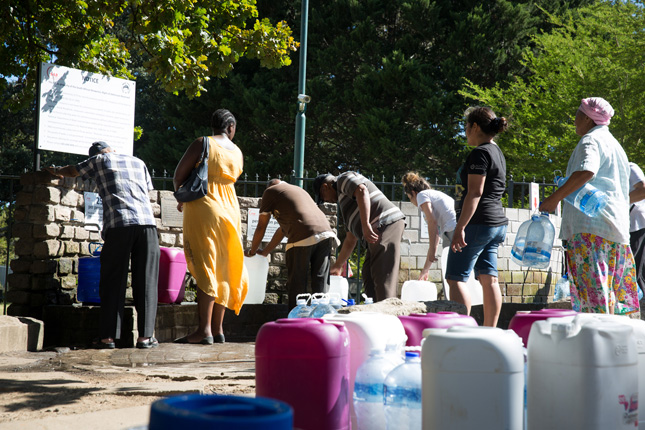
Intense drought in South Africa’s Western Cape Province has led the world-renowned city of Cape Town to the brink of “Day Zero”—the date at which residents would be forced to collect strictly rationed water supplies from shared distribution taps. Water conservation efforts have so far prevented a massive water shutdown, but the city’s rapid population growth and reliance on surface water dams makes it particularly vulnerable to lower precipitation levels.
-
Dr. Belen Garijo: “I Believe We Need To Do Better” For Caregivers Across The World
› “As many as 865 million of our mothers, daughters, [and] sisters across the globe are not reaching their full potential to contribute to their national economies,” said Dr. Belén Garijo, CEO for healthcare and executive board member of Merck KGaA, Darmstadt, Germany, at a recent Wilson Center event. The act of caregiving, and the physical and mental health impacts that accompany it, often disproportionately rest on the shoulders of society’s women.
“As many as 865 million of our mothers, daughters, [and] sisters across the globe are not reaching their full potential to contribute to their national economies,” said Dr. Belén Garijo, CEO for healthcare and executive board member of Merck KGaA, Darmstadt, Germany, at a recent Wilson Center event. The act of caregiving, and the physical and mental health impacts that accompany it, often disproportionately rest on the shoulders of society’s women. -
Maternal Health Experts: Strategic Partnerships and Data Key to Strengthening Health Systems
› “We need to think differently about how we invest in our country programs, and what outcomes we are interested in,” said Dr. Koki Agarwal, director of the U.S. Agency for International Development (USAID)’s flagship Maternal and Child Survival Program (MCSP) and a Vice President with Jhpeigo, at a recent Wilson Center event.
“We need to think differently about how we invest in our country programs, and what outcomes we are interested in,” said Dr. Koki Agarwal, director of the U.S. Agency for International Development (USAID)’s flagship Maternal and Child Survival Program (MCSP) and a Vice President with Jhpeigo, at a recent Wilson Center event. -
Can Climate Change Feed Extremism?
›
Global warming is not just an environmental problem.
Goodman: “It is one of the most serious national security challenges we face. This is a risk issue.”
-
2.6 Million Babies Are Stillborn Every Year
› Every day, 7,100 babies are stillborn. A tragic, complicated problem, stillbirth—which the WHO defines as a baby born with no signs of life at or after 28 weeks’ gestation—remains difficult to control and to assess. Some hospitals hide data on stillbirth, due to the shame and stigma associated with it. However, as White Ribbon Alliance CEO Betsy McCallon said at a recent Wilson Center event marking the 30th anniversary of the Safe Motherhood Initiative, stillbirth “had been hidden and neglected, but that is changing.”
Every day, 7,100 babies are stillborn. A tragic, complicated problem, stillbirth—which the WHO defines as a baby born with no signs of life at or after 28 weeks’ gestation—remains difficult to control and to assess. Some hospitals hide data on stillbirth, due to the shame and stigma associated with it. However, as White Ribbon Alliance CEO Betsy McCallon said at a recent Wilson Center event marking the 30th anniversary of the Safe Motherhood Initiative, stillbirth “had been hidden and neglected, but that is changing.” -
“It Can Be Done”: Address Malata’s Dream for Safe Motherhood in Malawi
› “Women still die…and they die preventable deaths,” said Address Malata, vice chancellor of the Malawi University of Science and Technology, at a recent Wilson Center event honoring the 30th anniversary of the Safe Motherhood Initiative. Malata—a midwife and the former vice president of the International Confederation of Midwives—told the heart-wrenching story of a pregnant woman who, like so many others, died waiting for transportation.
“Women still die…and they die preventable deaths,” said Address Malata, vice chancellor of the Malawi University of Science and Technology, at a recent Wilson Center event honoring the 30th anniversary of the Safe Motherhood Initiative. Malata—a midwife and the former vice president of the International Confederation of Midwives—told the heart-wrenching story of a pregnant woman who, like so many others, died waiting for transportation. -
An Unlikely Ambassador: Ghana Gurung on Snow Leopards and Community Resilience
› As a child growing up in Nepal’s mountainous Upper Mustang region, Ghana Gurung understood that his survival depended on the mountains and his community. Today, as senior conservation program director at World Wildlife Fund-Nepal, he works to protect the endangered and elusive snow leopard by improving local communities’ livelihoods and the mountains’ ecosystem.
As a child growing up in Nepal’s mountainous Upper Mustang region, Ghana Gurung understood that his survival depended on the mountains and his community. Today, as senior conservation program director at World Wildlife Fund-Nepal, he works to protect the endangered and elusive snow leopard by improving local communities’ livelihoods and the mountains’ ecosystem.
Showing posts from category New Security Broadcast.


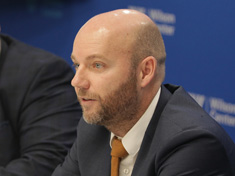 “Climate is unquestionably linked to armed conflict,” says Halvard Buhaug, Research Professor at the Peace Research Institute Oslo, in the latest Wilson Center podcast.
“Climate is unquestionably linked to armed conflict,” says Halvard Buhaug, Research Professor at the Peace Research Institute Oslo, in the latest Wilson Center podcast.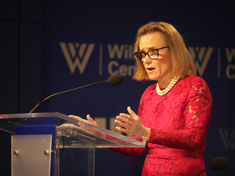 “As many as
“As many as 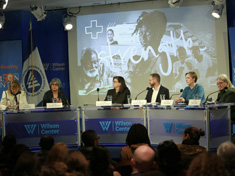 “We need to think differently about how we invest in our country programs, and what outcomes we are interested in,” said Dr. Koki Agarwal, director of the U.S. Agency for International Development (USAID)’s flagship
“We need to think differently about how we invest in our country programs, and what outcomes we are interested in,” said Dr. Koki Agarwal, director of the U.S. Agency for International Development (USAID)’s flagship 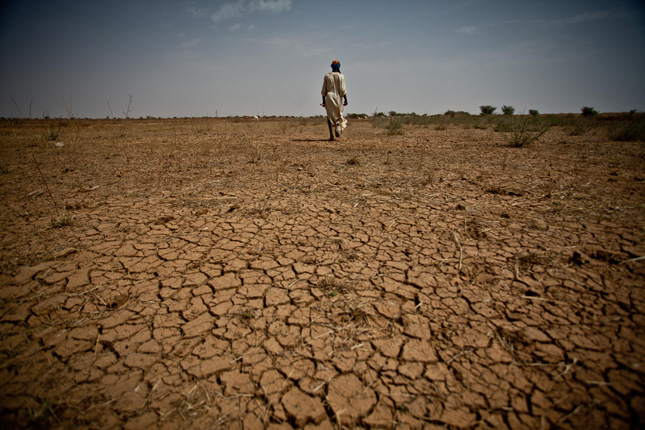
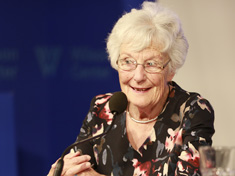 Every day, 7,100 babies are stillborn. A tragic, complicated problem,
Every day, 7,100 babies are stillborn. A tragic, complicated problem, 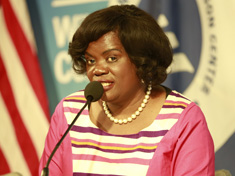 “Women still die…and they die preventable deaths,” said Address Malata,
“Women still die…and they die preventable deaths,” said Address Malata, 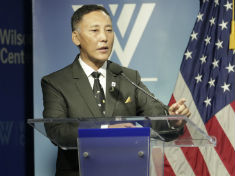 As a child growing up in Nepal’s mountainous Upper Mustang region, Ghana Gurung understood that his survival depended on the mountains and his community. Today, as senior conservation program director at World Wildlife Fund-Nepal, he works to protect the endangered and elusive snow leopard by improving local communities’ livelihoods and the mountains’ ecosystem.
As a child growing up in Nepal’s mountainous Upper Mustang region, Ghana Gurung understood that his survival depended on the mountains and his community. Today, as senior conservation program director at World Wildlife Fund-Nepal, he works to protect the endangered and elusive snow leopard by improving local communities’ livelihoods and the mountains’ ecosystem.

